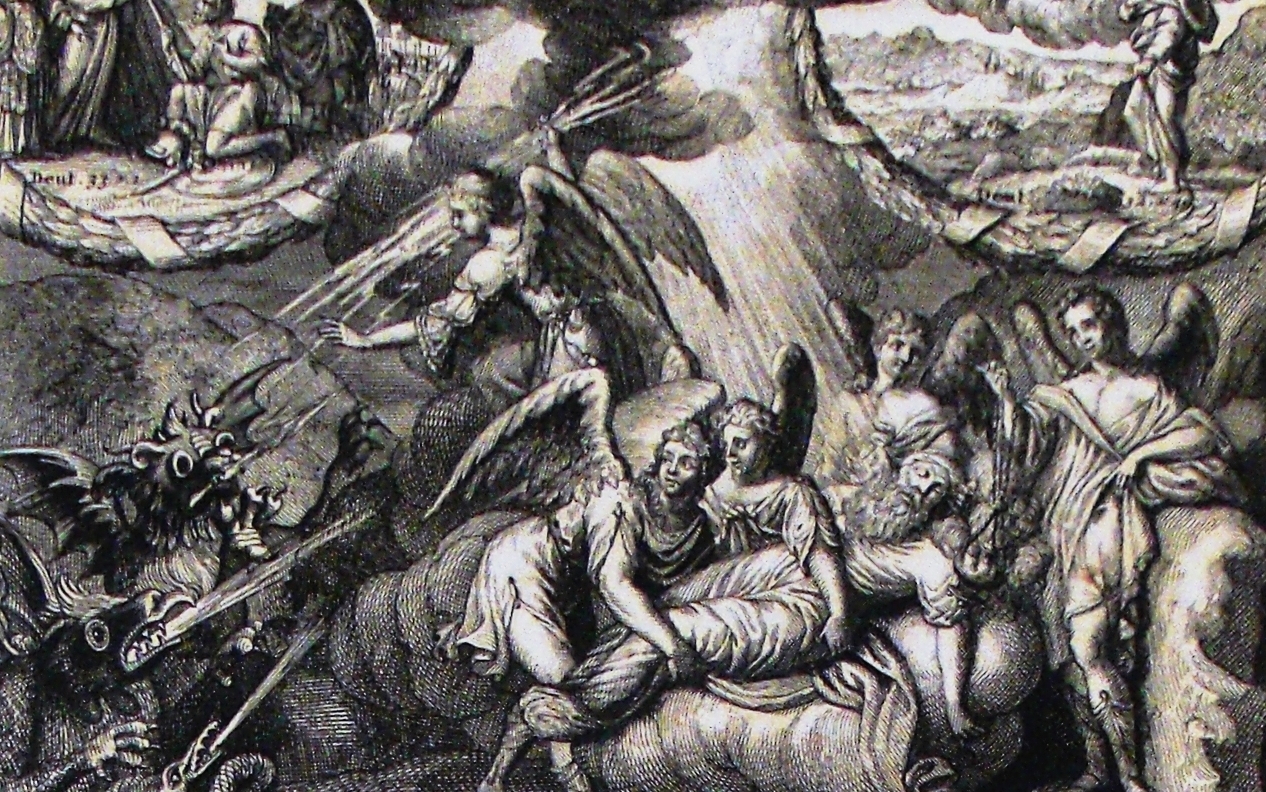Deuteronomy, the fifth and final book of the , has two Hebrew names: Sefer Devarim, short for (Sefer) ve’eleh hadevarim, “(The Book of) ‘These are the words,'” taken from its opening phrase; and Mishneh Torah, “Repetition of the Torah” (source of English “Deuteronomy”), taken from Deuteronomy 17:18. It consists of five retrospective discourses and poems that Moses addressed to Israel in Moab shortly before his death (Deuteronomy 1:6‑4:43, 4:44‑28:69, 29‑30, 32, 33), plus two narratives about his final acts (Deuteronomy 31, 34). The book’s core is the second discourse, in which Moses conveys laws that the people commissioned him to receive from God at Mount Sinai 40 years earlier.
Read the full text of Deuteronomy in Hebrew and English on Sefaria.
Exclusive Loyalty to God
Several themes in Deuteronomy stand out. Among the Torah‘s books, it is the most vigorous and clear advocate of monotheism and of the ardent, exclusive loyalty that Israel owes God (Deuteronomy 4:32‑40, 6:4‑5). It emphasizes God’s love, justice, and transcendence.
This book stresses the covenant between God and Israel, summed up in Deuteronomy 26:16‑19. Established with the patriarchs, affirmed at Sinai and in Moab, it is to be reaffirmed as soon as Israel enters its land (Deuteronomy 4:31, 5:2, 28:69, 27).

Help us keep Jewish knowledge accessible to millions of people around the world.
Your donation to My Jewish Learning fuels endless journeys of Jewish discovery. With your help, My Jewish Learning can continue to provide nonstop opportunities for learning, connection and growth.
Life in the Land of Israel
Deuteronomy looks toward Israel’s life in the land of Israel, where a society pursuing justice and righteousness, living in harmony with God and enjoying His bounty, can be established (Deuteronomy 4:5‑8, 7:12‑13). The promise of this land is conditional (Deuteronomy 11:8‑9, 21); Israel’s welfare depends on maintaining a society governed by God’s social and religious laws. These laws are a divine gift to Israel, unparalleled in their justice and their ability to secure God’s closeness (Deuteronomy 4:5‑8). The Torah’s humanitarianism is most developed in Deuteronomy’s concern for the welfare of the poor and disadvantaged.
Centralized Worship
Deuteronomy proclaims the unique rule that sacrifice may take place only in the religious capital, in a single sanctuary (Deuteronomy 12). Its aim is to spiritualize religion by freeing it from excessive dependence on sacrifice and priesthood. It urges instead studying God’s law and performing rituals that teach reverent love for Him. These teachings probably laid the groundwork for nonsacrificial, synagogue-based worship.
Deuteronomy’s Appeal to Wisdom
Deuteronomy has a strong intellectual orientation. It urges all Israelites to study God’s laws. Its style is didactic and sermonic, explaining the meaning of events and the purpose of laws, to secure Israel’s willing, understanding assent.
Deuteronomy and Judaism
Deuteronomy strongly influenced later Jewish tradition. The core of Jewish worship is the recitation of the (6:4) and the public reading of the Torah (rooted in 31: 11). Also based on Deuteronomy are the duty of blessing God after meals (Birkat Hamazon, Deuteronomy 8:10), [a prayer of sanctification] on (Deuteronomy 5:12), affixing s (also known as mezuzot) to doorposts, wearing (phylacteries) (Deuteronomy 6:8‑9, 11:18, 20) and (fringes) (Deuteronomy 22:12), and charity to the poor (e.g., Deuteronomy 15:8).
Deuteronomy is the source of the concept that religious life should be based on a sacred book and its study. As the biblical book that deals most explicitly with beliefs and attitudes, it plays a major role in Jewish theology. In the theological‑ethical introduction of his digest of Jewish law, the Mishneh Torah, Maimonides cites Deuteronomy more than any other book, starting with the command to believe in God and Him alone.
Deuteronomy’s effect on Jewish life cannot be overstated. No idea has shaped Jewish history more than monotheism, which this book asserts so passionately.
Excerpted with the permission of the Rabbinical Assembly from Etz Hayim: Torah and Commentary (© 2001 by The Rabbinical Assembly, published by the Jewish Publication Society ).
Birkat Hamazon
Pronounced: beer-KAHT hah-mah-ZONE, Origin: Hebrew, Grace After Meals, the blessing thanking God for the food.



